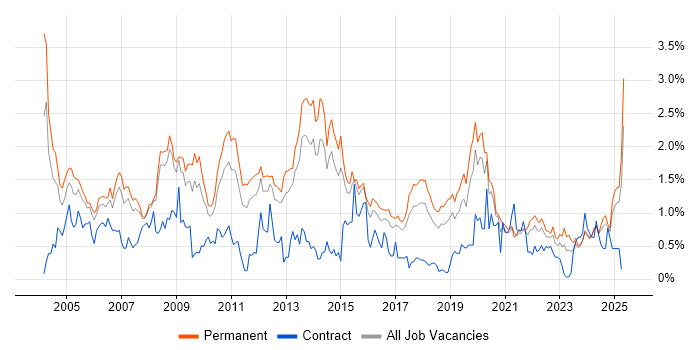Application Support
West Midlands > Birmingham
The median Application Support salary in Birmingham is £52,500 per year, according to job vacancies posted during the 6 months leading to 14 May 2025.
The table below provides salary benchmarking and summary statistics, comparing them to the same period in the previous two years.
| 6 months to 14 May 2025 |
Same period 2024 | Same period 2023 | |
|---|---|---|---|
| Rank | 85 | 127 | 122 |
| Rank change year-on-year | +42 | -5 | +39 |
| Permanent jobs requiring an Applications Support | 18 | 23 | 12 |
| As % of all permanent jobs advertised in Birmingham | 1.28% | 0.83% | 0.62% |
| As % of the Job Titles category | 1.35% | 0.88% | 0.66% |
| Number of salaries quoted | 18 | 14 | 12 |
| 10th Percentile | £33,350 | £27,225 | £25,838 |
| 25th Percentile | £41,250 | £35,000 | £27,750 |
| Median annual salary (50th Percentile) | £52,500 | £43,750 | £35,000 |
| Median % change year-on-year | +20.00% | +25.00% | -22.22% |
| 75th Percentile | £61,250 | £48,750 | £43,750 |
| 90th Percentile | £63,750 | £79,625 | £56,125 |
| West Midlands median annual salary | £42,500 | £32,121 | £38,320 |
| % change year-on-year | +32.31% | -16.18% | -4.20% |
All Permanent IT Job Vacancies
Birmingham
For comparison with the information above, the following table provides summary statistics for all permanent IT job vacancies in Birmingham. Most job vacancies include a discernible job title that can be normalized. As such, the figures in the second row provide an indication of the number of permanent jobs in our overall sample.
| Permanent vacancies in Birmingham with a recognized job title | 1,329 | 2,602 | 1,818 |
| % of permanent jobs with a recognized job title | 94.66% | 94.28% | 93.23% |
| Number of salaries quoted | 777 | 2,117 | 1,390 |
| 10th Percentile | £32,500 | £31,250 | £31,250 |
| 25th Percentile | £42,500 | £41,000 | £42,500 |
| Median annual salary (50th Percentile) | £55,000 | £55,000 | £55,000 |
| 75th Percentile | £68,750 | £70,000 | £71,250 |
| 90th Percentile | £83,750 | £84,964 | £81,525 |
| West Midlands median annual salary | £52,500 | £50,000 | £52,500 |
| % change year-on-year | +5.00% | -4.76% | +5.00% |
Applications Support
Job Vacancy Trend in Birmingham
Job postings that featured Applications Support in the job title as a proportion of all IT jobs advertised in Birmingham.

Applications Support
Salary Trend in Birmingham
3-month moving average salary quoted in jobs citing Applications Support in Birmingham.
Applications Support
Salary Histogram in Birmingham
Salary distribution for jobs citing Applications Support in Birmingham over the 6 months to 14 May 2025.
Applications Support Skill Set
Top 30 Co-occurring Skills and Capabilities in Birmingham
For the 6 months to 14 May 2025, Applications Support job roles required the following skills and capabilities in order of popularity. The figures indicate the absolute number co-occurrences and as a proportion of all permanent job ads across the Birmingham region featuring Applications Support in the job title.
|
|
Applications Support Skill Set
Co-occurring Skills and Capabilities in Birmingham by Category
The follow tables expand on the table above by listing co-occurrences grouped by category. The same employment type, locality and period is covered with up to 20 co-occurrences shown in each of the following categories:
